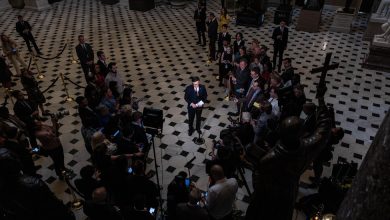
Hans Magnus Enzensberger, Leading Light in German Letters, Dies at 93
BERLIN — Hans Magnus Enzensberger, a poet, essayist, playwright, journalist, editor and translator whose wide-ranging intellect and writings resonated among West Germany’s postwar literary generation, died on Nov. 24 in Munich. He was 93.
His German publisher, Suhrkamp Verlag, announced his death but did not give a cause.
Considered one of the leading intellectual forces in West Germany and later in the reunified Federal Republic of Germany, Mr. Enzensberger was, by his own account, fluent in “about seven languages,” living across much of Europe, including Scandinavia, Italy, France and, in the run-up to the 1968 student revolution there, West Berlin.
A.S. Byatt once described him as “the ironic German par excellence” and an “ideal European — polyglot, polymath, skeptical and humane, with a strong sense of history both good and evil.”
When he was 16, Mr. Enzensberger made off with a crate of U.S. Armed Services Editions that he had found in the Bavarian village where he spent the final days of World War II, after defecting from the national militia. The box included works by Hemingway, Faulkner and F. Scott Fitzgerald, but it also held translations of works of German authors, Thomas Mann and Franz Kafka, that “nobody in Nazi Germany had ever read,” as he recalled decades later.
“The American Army, in other words, not only gave me a crash course in American civilization,” he wrote in an essay for The New York Times in 1985, “it also provided me with a first and tantalizing glimpse of my very own literature, the best part of which had been banned for 12 years.”
From that glimpse he would go on to become one of his country’s most varied writers, publishing more than 70 works, including volumes of poetry, essays, criticism, media theory and even a book explaining the wonders of mathematics to children, “The Number Devil,” which became an international best seller.
“I’ve had forays into the theater, I do some radio work, even television, some translation,” he said in an interview in 1989. “I hate being a specialist.”
In 1947, Mr. Enzensberger joined Group 47, a collective of West German writers — Günther Grass and Heinrich Boll among them — that defined a new voice for German literature, one that was as intellectual as it was political.
His controlled anger at the postwar establishment, which he viewed as complicit in the crimes of the Nazis, shown through in his first volume of poetry, “Defense of the Wolves” (1957). In a poem he titled “The wolves defended against the lambs”he wrote, “should the vultures eat forget-me-nots?/ what do you want the jackal to do/ cut loose from his skin, or the wolf? should/ he pull his own teeth out of his head?”
A second volume of poetry, “landessprache,” followed in 1960. Three years later, at 33, he became the youngest author to be awarded one of Germany’s highest literary honors, the Büchner Prize.
Mr. Enzensberger described his role as a writer during that time as “sort of being a sanitation worker: you had to clean up the place.” That attitude earned him swift praise and popularity in the English-speaking world but derision at home, where to the more established critics of the time he represented the “angry young man.”
Unimpressed with the moniker and eager to see more of the world, he spent several years abroad.
“Then I left Germany for a long period of time, because when you spend your time fighting something, you become in a sense part of it, and I didn’t want to become an obsessive German, one way or another,” he said. “I felt this was really a limitation which in the long run I couldn’t accept. I did my part of the job and then I left, so I could think of other things.”
Hans Magnus Enzensberger was born on Nov. 11, 1929, in Kaufbeuren, a village in the Bavarian alps. His father, Andreas Enzensberger, was a telecommunications technician; his mother, Leonore (Ledermann) Enzensberger, was a kindergarten teacher. The eldest of four brothers, Hans was viewed at a young age as already having an extraordinarily alert and critical mind as well as an unruly temperament.
After the war, he quickly earned his high school diploma and went on to study literature and philosophy at universities in Freiburg, Hamburg, Paris and Erlangen, where he earned a doctorate in philosophy in 1955.
He also worked as an editor for a public radio station in Stuttgart and in 1967 launched “Kursbuch” (or “Railroad Timetable”), an influential journal for progressive intellectuals. It would go on to inspire a generation of those who, like him, sought to break free of a postwar system in West Germany that they viewed as tied to the past. The 1968 student revolt that began in West Berlin spread across West Germany and altered the course of the country’s politics, literature and education systems.
“I was not a student, I was much older, but it was for me a very important experience,” Mr. Enzensberger recalled. “In hindsight, one can say it made the place inhabitable because whatever else may be said about the ludicrous sides of it, it achieved a modernization of social relations in this country, which were still sort of stuck in the 1940s or ’30s or God knows when. It became a contemporary country.”
After his death, his wife, Katharina, received a condolence letter from President Frank-Walter Steinmeier of Germany citing Mr. Enzensberger’s boundless curiosity. “Your husband never shied away from asking even the seemingly simple questions,” Mr. Steinmeier wrote. “Inexhaustible originality, surprising thoughts, delight in wit and irony were the unmistakable signature of his works.”
In addition to his wife, Mr. Enzensberger is survived by their daughter, Theresia Enzensberger, a journalist and author; and a daughter, Tanaquil Enzensberger, from his first marriage, to Dagrun Kristensen, which ended in divorce. A second marriage, in 1967, to Maria Makarowa, also ended in divorce.
While on a fellowship at Wesleyan University in 1968, Mr. Enzensberger denounced the U.S. government in an open letter published in The New York Review of Books and announced that he was vacating the post to join the revolutionary movement in Cuba. “For it is one thing to study imperialism in comfort,” he wrote, “and quite another thing to confront it where it shows a less benevolent face.”
While in Cuba, he collaborated with the German composer Hans Werner Henze on “El Cimarrón,” a work he described as a 75-minute “recital for four musicians.” It is an adaptation of a prominent book that told the true story of Esteban Montejo, an escaped Afro-Cuban slave who lived in the jungle and fought for Cuba’s independence from Spain.
It was also in Cuba that he began his epic narrative poem, “The Sinking of the Titanic,” which explores the lasting fascination with myths of catastrophe and considers the weaknesses of modern society. In it he wrote: “I saw the iceberg, looming high/ and cold, like a cold fata morgana,/ it drifted slowly, irrevocably,/ white, nearer to me.”
Mr. Enzensberger returned to Germany in 1979 and settled in Munich, where he started a publishing house, The Other Library, which helped develop young authors, including the German novelist W.G. Sebald and the Polish writer and journalist Ryszard Kapuscinski.
Many of his later essays and books focused on the state of Europe after the fall of the Berlin Wall and the collapse of communism in the Soviet bloc. He remained fiercely political, outspoken in his support of the Persian Gulf War, and created a stir when he compared Saddam Hussein of Iraq to Hitler.
In his book “Civil Wars,” which explored evolving ideas of nationalism and community by comparing the bloodshed from the breakup of Yugoslavia to the urban riots in the United States in the 1990s, Mr. Enzensberger described a world defined by an “inability to distinguish between destruction and self-destruction.” In this world, he wrote, “there is no longer any need to legitimize your actions. Violence has freed itself from ideology.”
Yet even as he contemplated humanity at its worst, he infused his writings with a sly wit that rendered them almost comic. In an essay published in The Times in 1975, “A Brief Note On Doom,” he looked at what he called the “secularization” of the Apocalypse in the modern world, calling Doom “the Last Word in Entertainment, or “a commodity like any other.”
Regardless, he concluded that Doom was here to stay, writing, “Today everything will go on, a little worse maybe than last week, but not noticeably different.”



